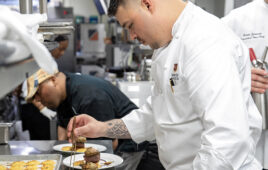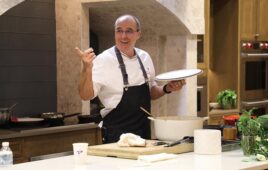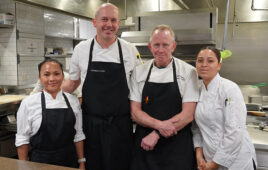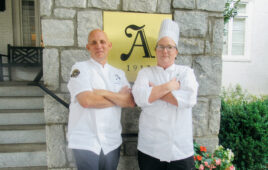Executive Chef Simon Lewis has brought new culinary star power to The Riviera Country Club.
The Riviera Country Club, in Pacific Palisades, Calif., is famous for its rich golf tradition, highlighted by being where Ben Hogan won his first U.S. Open in 1948. In recent decades, the club has been a very important stop on the PGA Tour every February, hosting the Northern Trust Open.
The Riviera is also well-known for being a playground for the rich and famous. A photo of a foursome consisting of Dean Martin, Bob Hope, Jerry Lewis and Bing Crosby hangs in the clubhouse. Many celebrities attended when the club hosted the equestrian competition of the 1932 Olympic Games.
The club was purchased by Japanese real estate tycoon Noboru Watanabe in 1989, with Watanabe paying just $108 million to the descendants of founder Frank Garbutt for what today seems a very small price for such a storied piece of American history.
Simon Lewis became The Riviera’s new Executive Chef last November, and immediately began his quest to help enhance the club’s status as a dining destination. His experience working for the well-regarded Joel Robuchon in Las Vegas, as well as his prior experiences with other restaurants and high-volume operations, make him uniquely qualified to bring renewed prominence to this landmark property.
We appreciate Chef Lewis taking the time to share his thoughts on how he plans to continue to elevate the cuisine provided to members and guests in such an historic setting.
C&RB: Chef, what has been the biggest difference coming from Joel Robuchon Restaurants to a great club like The Riviera?
Lewis: I have worked in many different environments throughout my career, from James Beard award-winning and Michelin three-starred freestanding restaurants to hotels and casinos. Yes, the kitchens are different in numerous ways, but they are all consistent in their staffs and in the challenges and opportunities that they present. As a chef you have to build and mold a team to strive for perfection and what you want to get out of them.
At Robuchon, we did world-renowned, high-end cuisine each day—but it was always similar in the menu and style of cooking. At Riviera, we may do a gourmet dinner for a visiting VIP one day, a New York hot dog for a guest at the halfway house the next, and in between our Courtside Grill is producing wonderful new American cuisine. While preparing for a major golf tournament like the Northern Trust Open, we are serving members satisfying and interesting lunches and dinners at the same time.
The team and I are challenged and happy to use our variety of skills and some culinary magic to please our members and guests each day. I also am able to travel to our other properties around the world, which is an experience I am thankful to our owner for—he has allowed me to open my mind and soul to new ideas and thoughts on a global scale.
C&RB: How have you sought to balance Riviera’s menu, meshing some seasonal specialties from Joel Robuchon’s with some old club favorites?
Lewis: We are constantly doing different cuisines in varied venues throughout the club property, which makes the job fun. Our owner has given us such inspiration to try new ideas, new venues and new menus that we can’t help but be inspired to expand our boundaries. I am constantly trading ideas for plating and cooking with the chefs from [our owner’s] properties in Japan, China and Singapore, and we challenge each other to raise the bar.
Internally, each of the team members have a say in what we do, and we raise the bar by tasting, creating dishes, and challenging each other to move to a higher level of culinary excellence. Living and working in California, we are near so many great, fresh ingredients you can’t help but be inspired from the land and the sea.
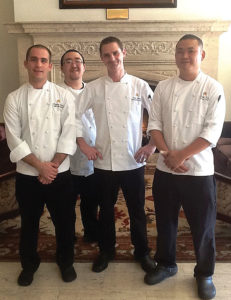
Chef Simon (second from right) gives his sous chefs specific areas of focus that they run as their own “mini-operations.”
Due to the international and VIP nature of our membership, for example, the lunch menu is very diverse and features global cuisine such as ramen noodles, Korean short ribs, fish tacos and a Nicoise salad, plus club favorites and even items wholly sourced from our own organic garden (which we are in the process of expanding, to add a small farm area that will concentrate on three to four items per growing cycle).
At Joel Robuchon, we would highlight a few ingredients done extremely well and presented artistically. Here, we strive to upgrade club favorites using that philosophy and expose members and guests to more international flavors and new cooking techniques.
C&RB: How are the sous chefs that you brought from Las Vegas enjoying the change of scenery? Are they challenged, and in what ways are they expressing themselves?
Lewis: Although the team members have limited time away from work, I know that they enjoy the vibrant, major-city lifestyle that Los Angeles offers, as well as being near the ocean. The team has told me that the challenges of Riviera, the variety of projects they face, the culinary styles that they use, and the non-stop action of a large, active country club is exciting and stimulating, to keep them energized and excited to come to the club each day.
We have given each sous chef a specific area to concentrate and improve upon, so they are basically running their own mini-operation as well as contributing to the strategic direction that our General Manager, Don Emery, and I have laid out. The visual changes to personnel, menus and standards, which have resulted in large increases in participation by members and positive feedback from guests, are proof that their hard work is paying off.
C&RB: Most new club chefs have a strong background in either a la carte or banquet. You have extensive experience in both. How has this benefited you?

The Riviera CC has hosted the Northern Trust Open, an important PGA Tour stop, in February for
several decades, adding to the club’s storied golf history.
Lewis: In quick order, I believe, I have been able to size up our team members and the challenges the culinary department has been presented with, and then develop a plan of action. Drawing from the varied backgrounds and experiences that I have had was great, but I also knew I had to listen, observe and learn here at Riviera as well.
Senior management at the club has given me free rein and the resources to quickly change and evolve the department to where we are, just one short year from when I arrived. We have a long path ahead to achieve a reputation and ranking for our culinary efforts equal to that of our storied golf course, but that is our ultimate goal.
Having been able to bring in a team of professionals that could help us move each area towards that goal has also been vital to our success. In both a la carte and banquet, I have found that it is people and their desire to achieve hospitality, and to strive towards high service standards, that will ultimately help you achieve your goals.
C&RB: In your first year at the club, you did the Northern Trust Open, a huge PGA Tour event, without the help of outside foodservice contractors. What were the keys to successfully pulling everything off on your own?
Lewis: Organization, people and communication are the keys. You have to plan ahead, as it takes months of preparation to create and test menus that will be well-received, while also highlighting the club’s value, style and insight to food and beverage. Obtaining staff that has tournament experience or knows how you work and what you expect is another vital part of the success plan.
With good communication throughout the year of preparation and the long days of the event, you’re able to create detailed room set-up, prep and execution lists for future years. At the end of every day, the entire team meets to discuss what can be done better for the following day. We then incorporate these into our plan of action for future years.
C&RB: Chef, you speak of your “back to basics” approach in your kitchen. Can you elaborate on how you feel we are forgetting how to cook, in the face of trends like molecular gastronomy?
Lewis: Throughout my career, I have watched so many young chefs walk in and out of kitchens wanting to just jump on the line and cook with the new trends, before fully understanding the fundamentals and how food reached that point.
Food is always evolving, and that’s great—but the industry is forgetting the basics, understanding how to first properly sharpen a knife; how to butcher meat and fish; when to season; cooking methods; terms like Maillard reaction, mother sauces and panade, and so on.
Upon arriving at The Riviera Country Club, I realized that before I could possibly move forward with revamping the menus and introducing more elaborate cuisine on a daily basis, I needed to start with the basics and just improve and do it the right way with menus that were in place.
Now we have a platform to build on and the progression is simple, to ensure that we execute it properly on a daily basis. But the team is making huge strides on elevating the food here.
I do go out to eat regularly and enjoy the new trends such as molecular gastronomy. But after working with Robuchon for an extended time, I learned to appreciate the simplicity of quality food and amazing ingredients.
Recipes:
Dill Cream, Brioche Toast, Egg Yolk and Paddle Fish Caviar
Cornish Cubano Pastry



